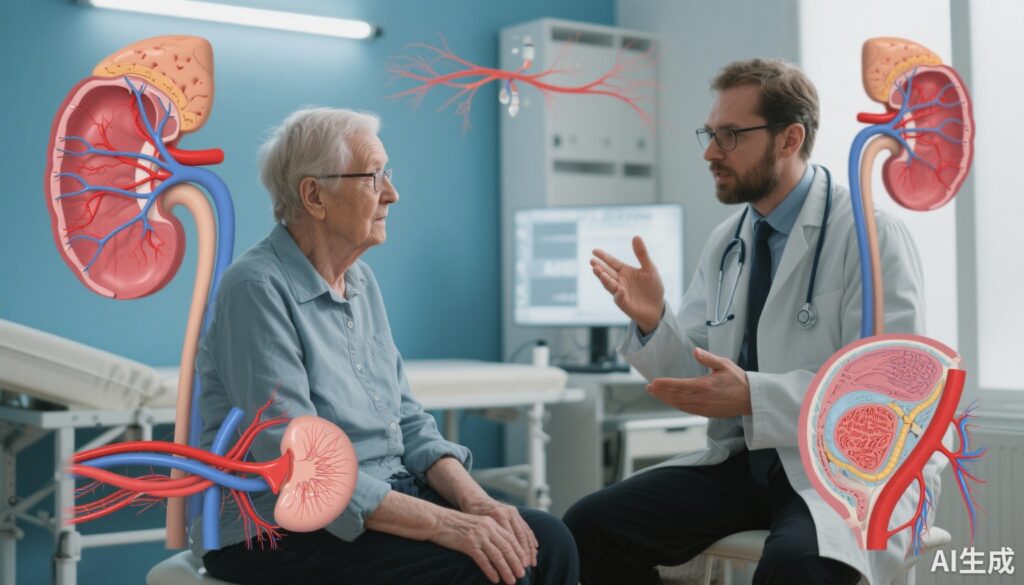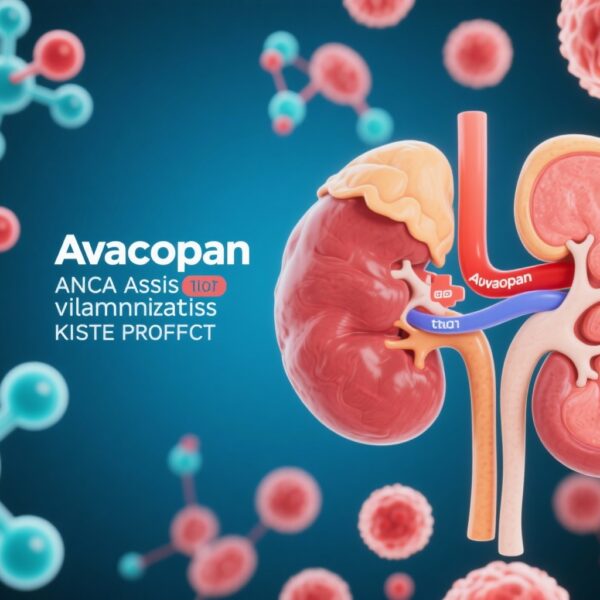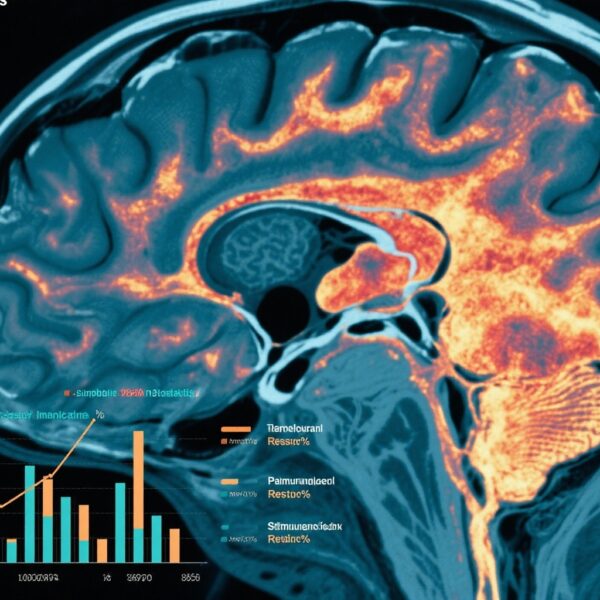Highlight
- Avacopan demonstrated comparable or superior remission rates to prednisone taper in patients aged ≥65 with GPA or MPA.
- Use of avacopan resulted in significantly lower glucocorticoid exposure and toxicity in older patients.
- Relapse rates were lower in avacopan-treated patients across elderly age subgroups.
- Adverse event rates were similar between avacopan and prednisone taper groups, supporting avacopan’s safety profile.
Study Background
Antineutrophil cytoplasmic antibody (ANCA)–associated vasculitis (AAV), including granulomatosis with polyangiitis (GPA) and microscopic polyangiitis (MPA), is a rare but severe autoimmune small-vessel vasculitis frequently affecting older adults. The management of AAV traditionally involves prolonged high-dose glucocorticoids combined with immunosuppressants such as rituximab or cyclophosphamide. However, elderly patients face increased risks of glucocorticoid-related toxicity including infection, osteoporosis, diabetes, and cardiovascular events. The need for effective therapies that minimize glucocorticoid exposure while maintaining disease control is particularly critical in this population.
Avacopan is a novel oral complement 5a receptor (C5aR) antagonist that targets the complement pathway implicated in AAV pathogenesis. By blocking C5a-mediated neutrophil activation, avacopan offers a glucocorticoid-sparing approach. The phase 3 ADVOCATE trial established avacopan as an effective alternative to prednisone taper in treating AAV; however, specific post hoc analyses focusing on older adults aged ≥65 years had not been previously reported. Understanding efficacy and safety in this age group is essential given their heightened vulnerability.
Study Design
This post hoc analysis utilized data from the ADVOCATE trial, a randomized, double-blind, phase 3 study comparing avacopan (30 mg twice daily) to a standard prednisone taper, each combined with either rituximab or cyclophosphamide followed by azathioprine. Participants included patients with active GPA or MPA. For this analysis, patients were stratified into age subgroups: 65-74 years and ≥75 years. Key efficacy outcomes were remission at week 26 and sustained remission at week 52. Safety outcomes included adverse events and glucocorticoid-related toxicity. Renal function, assessed by estimated glomerular filtration rate (eGFR), and health-related quality of life (HRQoL) were secondary endpoints.
Key Findings
The analysis included 160 patients aged ≥65 years: 109 between 65–74 years and 51 aged ≥75 years. The remission rates at week 26 were similar between the avacopan and prednisone taper groups across both age brackets — 71.7% vs 69.4% in the 65–74 group, and 73.1% vs 72.0% in those ≥75. By week 52, sustained remission favored avacopan, with 65.0% vs 55.1% in the 65–74 subgroup and 65.4% vs 56.0% in the ≥75 subgroup, although these data were descriptive without inferential statistics provided.
Relapse rates were notably lower with avacopan: 12.3% vs 18.8% in the 65–74 group and 3.8% vs 20.8% in patients aged ≥75. Both treatment groups experienced improvements in eGFR and HRQoL, supporting disease control and patient well-being.
Importantly, the use of avacopan was associated with substantial glucocorticoid dose reductions: 61% reduction in the 65–74 cohort and 49% in the ≥75 group compared with prednisone taper recipients. This glucocorticoid sparing translated into lower glucocorticoid toxicity scores, a crucial consideration in older individuals where steroid side effects compound comorbidity burden.
Safety profiles were comparable between avacopan and prednisone taper groups within each age subgroup, with no new safety signals identified. The similarity in adverse event rates supports avacopan’s tolerability even in this vulnerable population.
Expert Commentary
This post hoc analysis provides valuable insights into managing AAV in older adults. The comparable efficacy and lower relapse rates with avacopan, alongside significant glucocorticoid dose reduction, directly address the unmet need for safer treatment alternatives in elderly patients at risk of steroid toxicity. While the sample size is modest and this analysis is descriptive, the consistency of findings with the main ADVOCATE trial results bolsters confidence.
Avacopan’s mechanism of selectively blocking the C5a receptor offers a targeted approach that may mitigate systemic immunosuppression associated with glucocorticoids, thereby reducing infection and other adverse events. These data align with emerging guideline perspectives advocating glucocorticoid minimization strategies in AAV, especially among older patients with higher cumulative toxicity risk.
Limitations include the post hoc nature of the analysis, potential selection bias in older patients enrolled in clinical trials, and lack of formal statistical testing for subgroup comparisons. Further prospective studies focusing exclusively on elderly populations could clarify long-term safety and functional outcomes.
Conclusion
The current post hoc analysis from the ADVOCATE trial supports the use of avacopan as an effective and safe treatment for older adults (≥65 years) with GPA or MPA. Avacopan-based regimens achieve sustained remission with reduced glucocorticoid exposure and lower toxicity, offering a clinically meaningful option to improve outcomes in this challenging patient group. These findings encourage wider adoption of complement-targeted therapies to optimize AAV management in the elderly.
Funding and ClinicalTrials.gov
The ADVOCATE trial was funded by ChemoCentryx, Inc. The trial registration number is NCT02994927.
References
- Geetha D, Pagnoux C, Sattui SE, et al. Efficacy and safety of avacopan in patients aged 65 years and older with ANCA-associated vasculitis: a post hoc analysis of data from the ADVOCATE trial. Rheumatology (Oxford). 2025;64(6):3863-3871. doi:10.1093/rheumatology/keaf122
- Jayne D, Merkel PA, Schall TJ, Bekker P. Avacopan for the Treatment of ANCA-Associated Vasculitis. N Engl J Med. 2021;384(7):599-609. doi:10.1056/NEJMoa2023617
- Yates M, Watts RA, Bajema IM, et al. EULAR/ERA-EDTA recommendations for the management of ANCA-associated vasculitis. Ann Rheum Dis. 2016;75(9):1583-1594. doi:10.1136/annrheumdis-2016-209133



